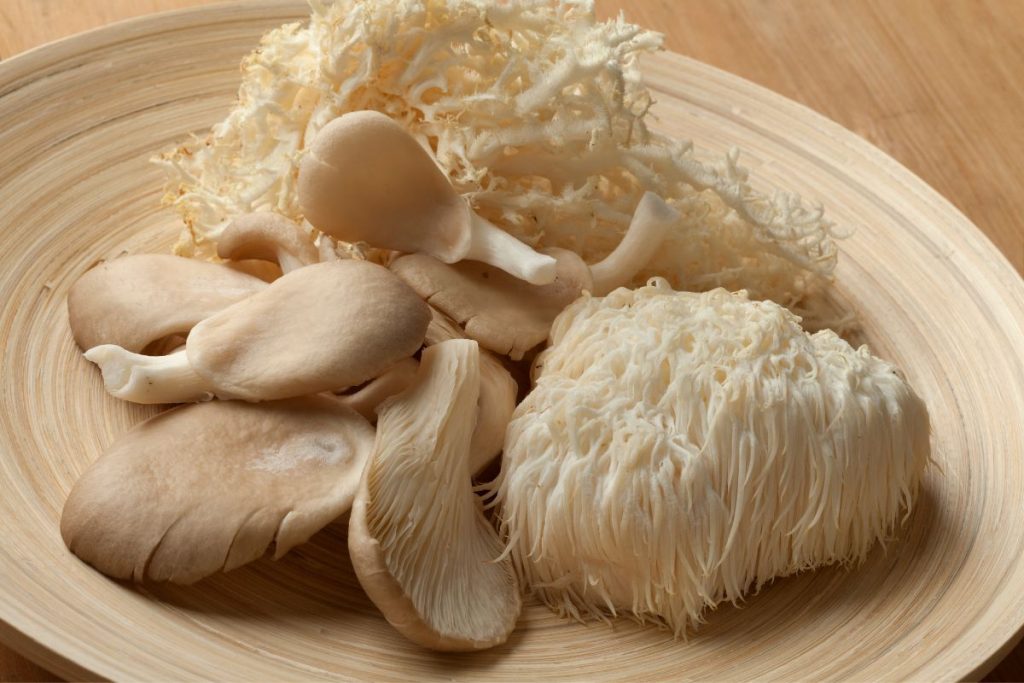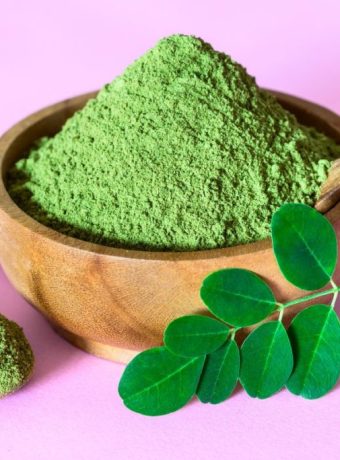7 Must-Know Benefits of Mushroom Supplements for Better Health

Last Updated on May 29, 2024 by Lauretta Iyamu, PharmD
Do you often feel run down or face common health problems like low energy or poor digestion? Many people do. The good news is that natural solutions, like mushroom supplements, can help you feel better.
Mushroom supplements are gaining popularity because they offer a variety of health benefits. In this article, you’ll learn about the benefits of mushroom supplements for improving your health and why they might be a great addition to your wellness routine.
What Are Mushroom Supplements Good For?
Mushrooms have been revered in traditional Chinese medicine and other ancient practices for centuries.
Their use in health and healing rituals underscores their potent medicinal properties, with Ganoderma lucidum (Reishi) being a standout for its longevity-enhancing benefits.
Mushroom supplements stand out due to their unique bioactive compounds.
Unlike typical health supplements, mushrooms like shiitake, reishi, and lion’s mane are rich in polysaccharides, triterpenoids, and beta-glucans, which promote a healthy immune system and support robust health.
Benefits of Mushroom Supplements

1. Nutritional Value and Bioactive Compounds
Mushrooms are a powerhouse of nutrients. They are packed with proteins, vitamins, minerals, and dietary fibers that help your body function properly.
Vitamins: For example, mushrooms contain vitamins B2, B3, B5, B9, and D. These vitamins help maintain energy levels and support brain function.
Minerals: They are also rich in minerals like selenium, potassium, and phosphorus, which are important for your immune system and bone health.
Dietary Fibers: Fibers like beta-glucans and chitin are also present in mushrooms. These fibers support your digestive health and can help reduce inflammation in your body.
Mushrooms have extensive nutritional benefits, making them a great choice for anyone looking to improve their overall health.
2. Immune System Support
Medicinal mushrooms like Reishi, Shiitake, and Turkey Tail are well-known for their immune-supporting properties.
These mushrooms contain compounds called polysaccharides, especially beta-glucans, which are very good at helping your immune system.
Beta-glucans stimulate the activity of immune cells such as macrophages, natural killer cells, and dendritic cells. This means your body becomes better at fighting off infections and diseases.
Types of Mushrooms that improve immune health
For instance, Reishi mushrooms have been used for centuries to support the immune system.
They help your body fight stress and keep you feeling balanced.
Shiitake mushrooms are another great option for enhancing your body’s defense mechanisms.
Turkey Tail mushrooms are also very effective, with research showing they can improve the immune response.
Medicinal mushrooms like these enhance the immune system by boosting the body’s natural defense mechanisms against pathogens.
3. Antioxidant and Anti-inflammatory Effects
Mushrooms are rich in antioxidants. This unique property protects your body from damage caused by free radicals.
Free radicals are unstable molecules that can damage cells, leading to aging and diseases. By neutralizing these free radicals, antioxidants help keep your cells healthy and reduce the risk of chronic diseases.
Chaga and Reishi mushrooms are particularly high in antioxidants. These mushrooms fight free radicals and reduce inflammation in your body.
Inflammation is linked to many chronic diseases, including heart disease and arthritis. By reducing inflammation, these mushrooms help keep your body in good condition and even slow aging.
The anti-inflammatory properties of mushrooms are beneficial for relieving chronic inflammation and associated health issues.
4. Cancer Prevention and Treatment
Studies have shown that medicinal mushrooms can play a role in cancer prevention and treatment. Compounds found in mushrooms, such as polysaccharide krestin (PSK) and polysaccharide peptide (PSP) from Turkey Tail mushrooms, are used in cancer therapy.
These compounds can improve the effectiveness of chemotherapy and radiation treatments, making them more effective at killing cancer cells.
Additionally, these mushroom compounds help reduce the side effects of cancer treatments, improving patients’ quality of life. They support the body’s immune response to cancer and help prevent the growth and spread of cancer cells.
Mushrooms in cancer treatment have shown promise in enhancing conventional therapies and supporting patients’ overall health.
5. Gut Health and Prebiotic Benefits
Mushrooms contain prebiotic fibers that are good for your gut health. Prebiotics are non-digestible fibers that feed the beneficial bacteria in your gut.
This helps maintain a healthy balance of gut bacteria, which is important for good digestion and overall health.
Eating mushrooms can improve your digestion and enhance nutrient absorption. Whole mushrooms, rather than supplements, are generally recommended for their full prebiotic benefits.
This is because whole mushrooms contain a complex mix of fibers and other nutrients that work together to support gut health.
The prebiotic benefits of mushrooms are vital for maintaining a balanced and healthy gut microbiome.
6. Cognitive Function and Neuroprotection
Lion’s Mane mushroom is known for its potential to protect your brain and improve cognitive function. This mushroom promotes the growth of nerve tissue and protects against damage to the nervous system.
This can be particularly beneficial for people with conditions like Alzheimer’s disease, multiple sclerosis, and Parkinson’s disease.
Research has shown that Lion’s Mane can improve memory and cognitive function in older adults.
It supports brain health by encouraging the production of nerve growth factors, which are essential for the maintenance and survival of nerve cells.
The neuroprotective effects of Lion’s Mane help maintain cognitive functions and protect against neurodegenerative diseases.
7. Blood Sugar Control
Mushrooms help control blood sugar by managing how sugar is absorbed and utilized in the body, which is key for diabetes management.
Mushrooms high in beta-glucans slow down digestion and the release of sugar into the bloodstream. This helps prevent blood sugar spikes and keeps your levels stable.
For example, research shows that mushrooms can improve insulin sensitivity and lower blood sugar levels, making them a good addition to a diabetic-friendly diet.
8. Cardiovascular Health
Mushrooms are also good for your heart. They can help lower cholesterol levels and reduce blood pressure.
Reishi mushrooms, in particular, have been studied for their ability to improve cardiovascular health. They help reduce bad cholesterol (LDL) levels in the blood and increase good cholesterol (HDL) levels.
Lowering cholesterol and blood pressure reduces the risk of heart disease and stroke. Including mushrooms in your diet can be a natural way to support heart health.
The cardiovascular benefits of Reishi mushrooms include improving blood lipid profiles and supporting overall heart health.
Types of Mushrooms and Their Benefits

1. Reishi – The Mushroom of Immortality
Reishi mushrooms contribute to longevity and are particularly effective in enhancing immune health through their ability to activate natural killer cells and immune cells.
2. Lion’s Mane – The Brain Booster
This mushroom supports cognitive functions, enhancing memory and focus, which is essential for combating mild cognitive impairment.
3. Cordyceps – The Energy Enhancer
Known for boosting energy and stamina, Cordyceps are particularly beneficial for those looking to increase their physical endurance.
4. Chaga – The Immune Modulator
Chaga supports the immune system through its rich antioxidant content, which is needed for maintaining good health.
How to Choose the Right Mushroom Supplement
To ensure high quality and efficacy when selecting a mushroom supplement, consider factors like:
- Source
- Extraction process
- Certification
When choosing mushroom supplements, it’s important to choose high-quality products. Look for supplements that have been third-party tested for quality and purity.
Before adding mushroom supplements to your routine, consult with your healthcare professional. This is especially important if you have underlying health conditions or are taking other medications.
Your doctor or pharmacist can help you determine the right dosage and ensure the supplements are safe. Choosing safe mushroom supplements ensures you get the maximum benefits without adverse effects.
How to Add Mushroom Supplements to Your Diet

Mushroom supplements offer unique benefits that are not commonly found in other supplements. Their ability to support immune health, improve cognitive health, and relieve stress sets them apart in the supplement market.
Adding mushroom supplements to your diet can be straightforward. They are available in various forms, including capsules, powders, and teas, making them easy to include in daily routines.
Here are some ways you can add mushroom supplements to your diet:
Morning Routine
One easy way to include mushroom supplements in your diet is to add mushroom powder to your morning smoothie or coffee. This can give you an energy boost and support your overall health.
Cooking with Mushrooms
You can also cook with medicinal mushrooms like shiitake and maitake. Add them to soups, stews, or stir-fries for a delicious and nutritious meal.
Supplement Stacking
Another option is to combine different mushroom supplements for synergistic effects. For example, you might take reishi for immune support and lion’s mane for cognitive health. Just be sure to monitor your overall intake and consult with a healthcare provider if needed.
Potential Side Effects and Considerations
While mushroom supplements are safe for most people, they can interact with certain medications and aren’t recommended for everyone, particularly those with autoimmune conditions or those undergoing chemotherapy treatment.
Wrapping Up
Mushroom supplements offer many health benefits, from supporting your immune system to improving gut and brain health. They are a natural way to help you feel better and stay healthy.
As research continues, the potential of medicinal mushrooms to promote health and prevent diseases becomes even more exciting. Their wide-ranging health benefits make them a valuable addition to your wellness regimen.
However, choosing high-quality top mushroom supplement products and consulting with a healthcare professional is important to ensure safety and effectiveness.
Frequently Asked Questions About Mushroom Supplements
What Are the Best Mushrooms for Immune Support?
Reishi, turkey tail, and maitake mushrooms are excellent choices for improving your immune system.
Can mushroom supplements help with anxiety and depression?
Lion’s mane and reishi mushrooms have been shown to help reduce anxiety and improve mood, making them a good option for mental health support.
How long does it take to see benefits from mushroom supplements?
The time it takes to see benefits can vary depending on the individual and the specific supplement. Generally, you can expect to notice improvements within a few weeks to a few months.
Are mushroom supplements safe for children?
Mushroom supplements can be safe for children, but it’s important to consult a pediatrician before giving them to your child.
Can I take mushroom supplements with other medications?
If you are taking other medications, talking to your doctor before starting any new supplement is always a good idea to avoid potential interactions.



